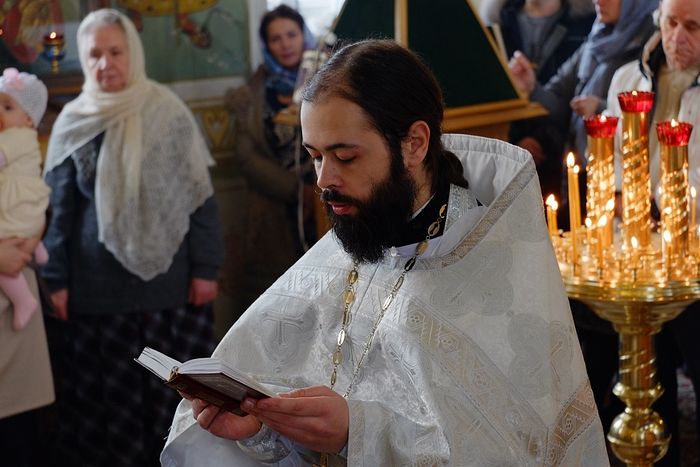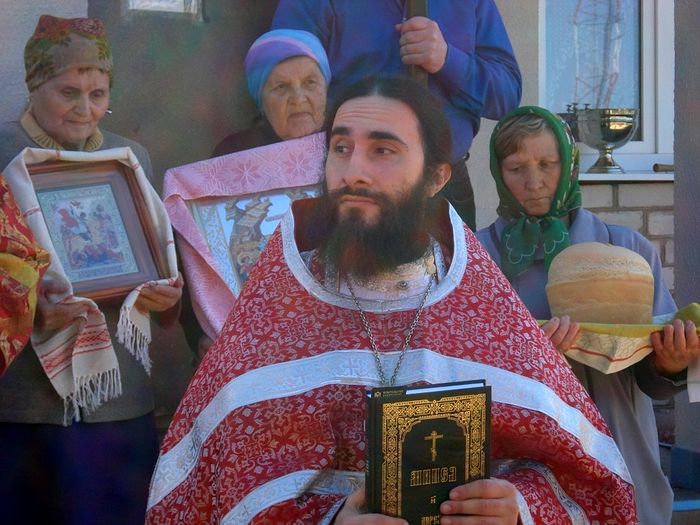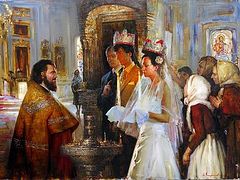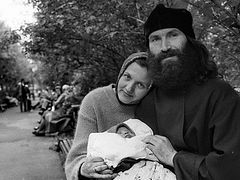The current marriage statistics in Russia are very sad. The divorce rate has risen both among those who were married in church and Christians who have integrated into Church life. It means that not everybody regards the sacrament of matrimony in a sober, serious light and understands what should follow the sacrament of marriage. So should priests marry all who ask for it only because the engaged couple wants it? How can we bring home to newlyweds the importance and greatness of this holy sacrament?
“We should marry those who wish to bear the cross of their family life to the end”
Of course, before performing the sacrament priests should talk with the couple, ideally more than once, explaining to the future husband and wife the meaning and implications of this sacrament and the spouses’ responsibilities. It is necessary for them to realize the spiritual importance of this sacrament both for their life together and for the life of each of them in eternity.
True, we cannot foresee and predict everything. Any union that is blessed by the Church presupposes that the spouses bear their cross, and walk with the Lord towards Golgotha in order to be worthy of partaking in His Glorious Resurrection. It must be explained to couples that they should not expect a constant wave of joys, bliss and “blessings from heavens” from a union that was blessed by the Church; they should also be prepared for temptations. Once they are faced with temptations, young spouses shouldn’t be surprised or confused; rather, they need to show courage in overcoming sorrows and difficulties while walking towards the Heavenly Kingdom.
Of course, we should wed all the couples that express this desire—to be more exact, a desire to bear the cross of their family life to the end with faith and patience, not just a desire for entertainment. And it should be responsible, conscious and mature. This is precisely the kind of aspiration that we, Orthodox pastors, must zealously cultivate within couples getting married.
“We don’t know how Divine grace works within people”
The Shepherd of Hermas, an early Christian document, contains a remarkable parable. In it, an angel showed Hermas many trees having no leaves, and seemingly withered. Hermas observed that all of them were like each other, dried up. The angel said in response that the trees were the images of people living in this world: Neither the righteous nor the sinners are distinguishable in this age, for they look alike. In this life on earth it is impossible to distinguish the righteous and the sinners just as one cannot discern which trees are withered and which are living, when all of them stand bare in winter and look very similar.
I think that this early Christian parable is relevant to our subject. After all, we don’t really know how Divine grace works within people—who receives it worthily and for whom it is a burning, scorching fire. Therefore, I cannot agree with the statement that we should refuse to wed people in church only because we have indirect evidence that couples are “immature” in Church life. In my opinion, in this case we ought to take some pains to devote more time to those desiring marriage, to explain to them the order of the service of holy matrimony and its meaning.
On the other hand, the question of a lack of understanding of life in the Church by the externals is above all a question to all of us, people of the Church: whether or not we participate in the holy sacraments with due attention and reverence; whether or not we set people around us a good example of a careful attention to Church life; or whether or not we show the fruits of our participation in the holy sacraments by our lives.
“Only parishioners may be involved in the sacraments of the Church”
Nowadays the divorce rate is extremely high because most of our young people are egotists. They fail to understand that marriage means making efforts to improve. Marriage is about cultivating love for our nearest and dearest within ourselves. For many, marriage is nothing more than legalized pleasure, but once the honeymoon is over and the time for podvig [in Russian: a sacrificial labor, an exploit] comes, they begin to pack their suitcases to divorce under the pretext of a “lack of understanding”. Should priests marry all comers? I don’t think so. Additionally, I am of opinion that we shouldn’t baptize everyone and perform funeral services over everyone. Only parishioners may be involved in the sacraments of the Church.
But how can we distinguish between “genuine parishioners” and “outsiders”? In most modern parishes there are no instruments for this. Unfortunately, in our days we have “parishes” rather than “communities”—where all members are brothers and sisters to each other. In order to solve this problem one needs to build a true community at his parish. Today it is next to impossible for many reasons.
“If we marry all couples indiscriminately, it will be a profanation of the sacrament”
Here is a real life story. A young man came with his girlfriend to a priest whom he knew and asked him to marry them. The priest organized a talk with them, asked them if their intentions were serious and told them about their responsibilities before God. Thereupon he married them. Barely a month later the young man abandoned his wife and filed for a divorce. The poor woman gave way to despair. Perplexed, the priest met with this poor excuse for a husband and asked him about what had happened, and the latter answered him perfectly calmly, “My wedding was just an attempt, and the church wedding ceremony was just a beautiful rite.” In other words, he said, “I have no obligations to anybody. I attempted to cast my lot with this girl but soon realized that my choice was wrong. And your church ceremony means nothing to me.”
If we marry all couples (who express a wish to marry) indiscriminately, it will soon develop into a profanation of the sacrament. In my view, today should we first and foremost strengthen people in spiritual life rather than persistently encourage them to marry in Church. When somebody learns to be faithful to God, he learns to be faithful to his nearest and dearest, including his better half. Without fidelity to your spouse, without a serious attitude towards this sacrament Church marriage loses its meaning.
It can be compared with the following situation. A priest has baptized a man, put a cross around his neck, but the latter says to him: “Listen, I don’t need your Christ!” It is a profanation of the sacrament. Any sacrament presupposes faithfulness. Holy Baptism supposes faithfulness to Christ, ordination—commitment to one’s Church ministry, repentance—being true to one’s promise to reform, matrimony—fidelity to each other and devotion to God Who blesses our unions.
A careless attitude towards the sacraments always leads to betrayal, and every betrayal entails a failure in life.
And here we can observe one important law. The sacrament of matrimony is of little avail if people are outsiders to the Church, if they rarely attend services and avoid regular participation in the holy sacraments of repentance and Eucharist. In a word, if active Church life is alien to somebody, then the sacrament of marriage will be ineffective in preserving his family bonds.
How can we bring home to newlyweds the importance and greatness of this holy sacrament? It is very difficult to do so, if they are not sufficiently mature spiritually. There is a saying: “When we put God first, all other things fall into their proper place.” He who longs for God will always act in accordance with his faith and will understand the importance of his wedding in Church. Any sin, any betrayal, lie, infidelity severs our relationship with our Creator. Any demonstration of kindness, humility, self-sacrificing love, and bearing one another’s burdens (cf. Gal. 6:2) brings us closer to God. Christians are called to create rather than destroy, to restore rather than break down, to improve rather than spoil.
Family is something that requires colossal effort and self-sacrifice. And he who leads a spiritual life feels how much the sacrament of marriage gives him. It takes place once in a lifetime, yet it nurtures the spouses throughout their life together by Divine grace, keeps them from making mistakes, and indeed in a period of crisis it remains the only thing to deter them from a false step. And, subsequently, once the crisis has been overcome, the grace of the marriage that was blessed by the Church comforts and gladdens the spouses along with their other family members and most intimate friends.









